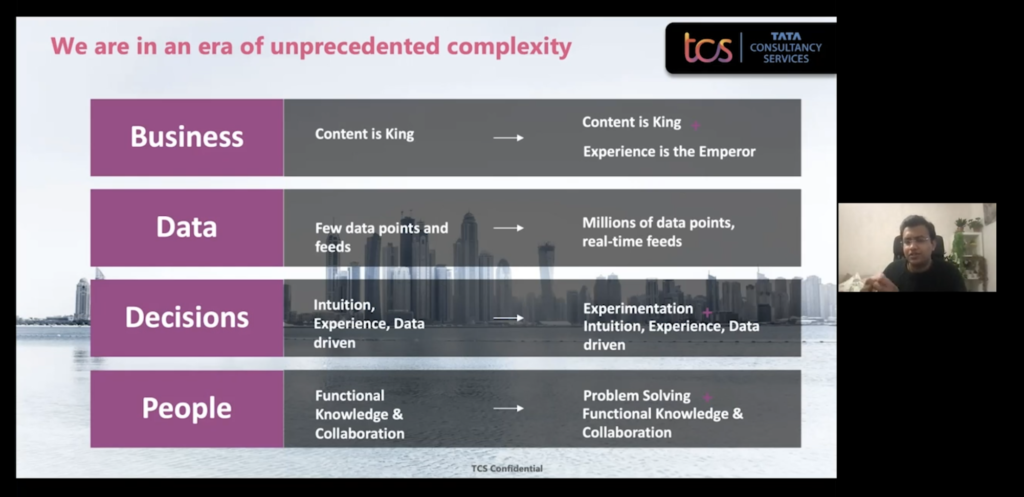M+E Daily

Tata: How to Embrace a Culture of Experimentation in the M&E Sector
Story Highlights
Embracing a “culture of experimentation” in the media and entertainment industry is “critical to drive differentiation and to drive growth in the market,” according to Narendran Sivakumar, AI advisory, products and platforms lead for Tata’s Communications, Media and Information Services business unit.
Speaking during the Audience, Insights & Evolution breakout presentation “Digital Twin-based Experimentation in the Media & Entertainment Industry” May 12 at the annual Hollywood Innovation and Transformation Summit (HITS) Spring event, he said we are in a “period of unprecedented complexity.”
For example, in the M&E business, content remains king but there is increasingly something important that goes far beyond the content, he said. And that is the overall experience, which is kind of the “emperor,” according to Tata Consultancy Services (TCS).
 Meanwhile, when it comes to the data being used in the sector, there used to be a few data points, but now there are “millions of data points coming from multiple channels, multiple consumption mediums, multiple user channels and user-generated content,” Sivakumar noted. And feeds have become real-time feeds, according to Tata.
Meanwhile, when it comes to the data being used in the sector, there used to be a few data points, but now there are “millions of data points coming from multiple channels, multiple consumption mediums, multiple user channels and user-generated content,” Sivakumar noted. And feeds have become real-time feeds, according to Tata.
When it comes to decisions, we still have intuition, experience and data coming into play, but now we are also “seeing significant experimentation coming into play” as well, Sivakumar pointed out.
And when it comes to the people hired by M&E organizations, in addition to having functional knowledge and being able to collaborate, it is now increasingly important to be a problem solver who can spot things that are new and innovative, he said.
This is an era in which complexities are threatening to overrun experience, he also noted, adding that coming up with new revenue sources is a significant area of importance.
This is also an era where outcomes are driven by how quickly businesses can re-orient themselves, decide and act after making necessary adjustments, he said.
“You have to start looking at the paradigm shift” and the experimentation that is needed now to succeed in the entertainment industry, he noted. Experimentation begins with asking the right business question and it is a challenge that is a “people problem more than a technical problem,” according to Sivakumar.
To re-orient, decide and act, the industry now needs to virtually replicate the environment, according to Tata.
 That brought Sivakumar to discuss the concept of “digital twins,” virtual representations that serve as the real-time digital counterparts of a physical object or process.
That brought Sivakumar to discuss the concept of “digital twins,” virtual representations that serve as the real-time digital counterparts of a physical object or process.
With TCS TwinX, which Tata launched four years ago, the company is enabling business experimentation for its customers, he said. Enterprise Digital Twin technology creates replicas of enterprise entities in a virtual environment that mimic the real-world entities very closely, according to Tata.
Digital Twins brings together: behavioral modeling of an entity to realize future goals; everyone that is part of an enterprise’s value chain being treated as an agent/agency of that enterprise, just like employees; and models learning from the agents (artificial intelligence models and human experts) and reality.
To view the entire presentation, click here.
HITS Spring was presented by IBM Security with sponsorship by Genpact, Irdeto, Tata Consultancy Services, Convergent Risks, Equinix, MicroStrategy, Microsoft Azure, Richey May Technology Solutions, Tamr, Whip Media, Eluvio, 5th Kind, LucidLink, Salesforce, Signiant, Zendesk, EIDR, PacketFabric and the Trusted Partner Network.









